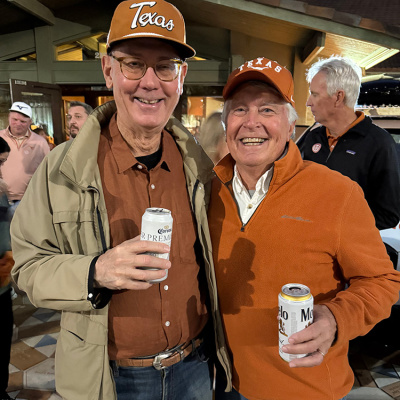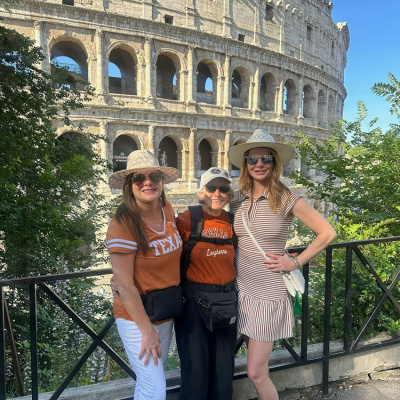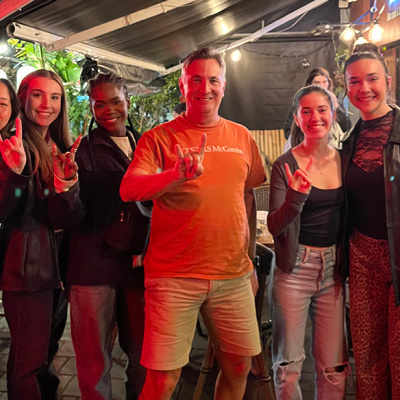Meet the New Orleans Obituaries Writer Who Has Spent Four Decades Keeping Stories of the Dead Alive

John Pope, the lanky Louisianan, the recherché raconteur on the river, the slim and sassy scribe, the zany Zelig from the land of Zapp’s, the boisterous bohemian in a bowtie, the Creole cuisine connoisseur in Carrollton, the empathetic eulogist of the Big Easy, did not die today.
He was, and still is, 70. He owned—owns!—a lot of eccentric bowties; two revolving racks of them, each stuffed with 200, to be exact. He did, and does, nothing quietly or peacefully. “Uh … no, honey,” he would say. Does say. He’s still alive.
When I fly to New Orleans to meet the thin, towering Pope, an obituaries writer for the New Orleans Times-Picayune since 1979, he does have a horrible case of allergies, but not a cold, like Frank Sinatra in Gay Talese’s famous profile for Esquire. Old Blue Eyes ran from Talese, using his affliction as cover. Pope, his eyes drooping and his voice barely audible, refuses to let me out of his grasp, insisting, even after a long day of traipsing around his city only to end up on the other side of the Mississippi at a tiny Catholic college named University of the Holy Cross, that we get breakfast for dinner after his hour-long talk and subsequent book signing for 2015’s Getting Off at Elysian Fields, a collection of gravest hits that he is still hustling three years later.
Before that omelet and hash that I’ll throw into my face almost directly off the flat-top at Camellia Grill, we walk past a large portrait of the other Pope in the main building of the tiny school. We turn a corner and there it is, a spread of deviled eggs and pasta salad and cookies and wines, red and white, and smiling Catholic faces ready to hear from the Pope who profiled the great Fats Domino upon his death.
He stalks the stage, which is really a podium inside a chapel that has had its holy sacrament removed for religious reasons.
“This looks like a pretty erudite crowd,” he says. “How many of you know the movie Citizen Kane? Okay. What’s the one word you remember from Citizen Kane?”
A few of the two dozen people in the crowd murmur, “Rosebud.”
“Louder,” Pope says.
“Rosebud,” most everyone now says in unison.
“Exactly. When I do an obituary, I’m looking for Rosebud. As you recall in the movie, this man was sent around to interview Charles Foster Kane’s people: lovers, associates, people who hated him, to find out what Rosebud might have meant,” Pope says. “So, I start asking questions, and you get at first the banalities like, ‘He loved his wife. He loved his family.’ Bo-ring. So you just keep asking.”
For about a half hour, Pope tells his favorite stories about being an obituaries writer, why he loves New Orleans, and how the two are essentially intertwined. His lecture—though he bristles at that word when I use it—ends on an anecdote about the 2008 funeral of Popeyes founder Al Copeland.
“His grave, in the Metairie Cemetery, it was like something you’d see in Egypt during the pharaohs,” he says. “Because all of his toys were out there. The motorcycle, the Lamborghini, the jet ski, the racing boat.”
The crowd hangs on his every word as he describes Copeland’s entrance, in a bronze casket inside a glass-walled hearse. The band played “St. James Infirmary Blues,” a slow, sad dirge made popular by Louis Armstrong. Copeland’s lucky number was 11, so 11 doves and 111 gold-and-white balloons were released.
“At New Orleans funerals, jazz bands always end with something upbeat. This time,” he pauses a beat, building to a crescendo, “was ‘Love That Chicken From Popeyes!’”
The crowd cackles as he vamps in front of the Virgin Mary. Later he’ll tell me that he’s learned to end there, like a comedian would, on a big laugh, because he has about a dozen of these talks under his belt at this point. He’s still working out his material.
And he loves it. Later, back at his house, he’ll tell me why he hasn’t fully retired, even after the Times-Picayune reduced him from staff writer to a contributor in September 2015.
“I had the thought to hang up my cleats but … no. I’m having too much fun doing this,” Pope says. “I’m a widower. All I can think of is Miss Havisham minus the rotting wedding cake. That’s just not me.”
Though Pope has written thousands of column inches on theatre, film, and health care, and has bylines at the Washington Post, Reuters, and Variety, Pope’s own obituary would lead with a list of all the obituaries he wrote for his hometown paper. At Holy Cross, he’s quick to point out that he’s not only interested in the big names, but rather all the characters of New Orleans who make the city what it is. He rejects the notion that obituaries are for luminaries and heads of state, and has used his platform to fight to get more space (or space at all) for obituaries he feels might shed light on not just a member of the New Orleans community, but on humanity itself.
Which means, whether you’re Fats Domino or Ruthie the Duck Girl, Pope writes your obituary only if the comprehensive story of New Orleans cannot be told without mentioning your name.

Karen Elliott House, has, among other honorifics, won a Pulitzer Prize for her reporting in the Middle East, interviewed every world leader from Vladimir Putin to Saddam Hussein, and served as senior vice president of the Dow Jones. In 1969, she was managing editor of The Daily Texan, eating her 20-cent lunch of a Butterfinger and a Dr Pepper when she noticed a tall, young reporter, who could have been a small forward on Leon Black’s basketball team. Specifically, she noticed his choice of lunch.
“There was John eating his pink yogurt,” she says. “I had no earthly idea what it was. I’m from a town in Texas where we ate fried chicken and steak. I had never seen yogurt.”
Though House, BJ ’70, Life Member, Distinguished Alumna, and Pope weren’t particularly close back then—they’d spend more time together as Friends of the Daily Texan decades later—she immediately noticed that, “he wasn’t doing what everybody else was doing.”
When the Kent State shooting occurred, Pope suggested printing John Donne’s “No Man Is an Island,” poem containing the famous conclusion: “any man’s death diminishes me, because I am involved in Mankinde; And therefore never send to know for whom the bell tolls; It tolls for thee.” He covered the state government, and called the legislature “his lab.” When Lyndon Baines Johnson returned to Texas from Washington, the Texan set Pope loose on him.
Pope arrived in Austin on a lark. His mother, a journalist for the Hattiesburg American, gave up her career when she met Pope’s father while reporting in the field. He was a land man with Humble Oil, and later, Exxon. When Pope was 9 months old, the family moved from Mississippi to Metairie, just over the parish line from New Orleans. He spent his childhood inhaling cinema at the local kiddie matinees: How Green Was My Valley and The Corn is Green were early screenings. During our few days together the film nut compares an event to or flatly references no fewer than 40 films, some of them—like A Streetcar Named Desire, or his favorite, Casablanca, an image that adorns his iPhone case—more than once. When he was 10, he saw The Diary of Anne Frank with his parents and had nightmares for weeks. He wrote a letter to Otto Frank, Anne’s father who survived Birkenau, and Otto wrote him back, with a picture of his daughter enclosed. He has kept it ever since.
At East Jefferson High School, he wanted to be a computer programmer. He was told he had two choices: the University of Southwestern Louisiana or The University of Texas. “I never clapped eyes on UT until I was accepted,” Pope says.
Pope fit right in at UT and at the Texan. Though he stuck with a mathematics major he diversified into the humanities, double minoring in history and journalism. He finished his master of arts degree in history two years later, and returned home and began applying for jobs at newspapers.
Pope, who has two younger sisters, Brenda and Cindy, says he wasn’t a black sheep of the family when he plunged full-force into journalism. Though he admits, “it took a bit of courage with my father.”
Much later, when Pope was an established name in New Orleans, his father was in a jury pool. He was asked if they had a son named John. He said, “yes, and I’m very proud of him.” He was dismissed.
Pope caught on with the States-Item, New Orleans’ afternoon paper in June of 1972, and remained there until it merged with the New Orleans Times-Picayune in 1980.
Back in the early 1970s, Pope, the lover of film and future obituaries stalwart, wasn’t known for either. He remembered UT journalism professor Griff Singer, to whom he and the Friends of the Daily Texan dedicated the lobby of UT’s Belo Center this past fall, telling him he’d wind up doing science reporting. He scoffed at it at the time.
“Guess who wound up writing about medicine for 20 years … Hello!” Pope covered three global AIDS conferences, reporting on a health crisis that in the early 1980s was rife with misinformation. After following Paul Roget, a young man dying of AIDS, around New Orleans for months until he died, he insisted that AIDS be listed as a cause of death, which was not the preference for the family of the deceased, especially not in the early days of the disease.
“I went into an editorial meeting and said we should include it, and they said ... OK,” Pope says. “So much for my eloquent argument."

I meet Pope, as he likes to refer to himself, one name, religion-adjacent like Madonna or Divine, in his home in the Carrollton neighborhood about a mile east of the Mississippi River in New Orleans. Built in 1906 and purchased by Pope and his wife Diana in 1986, it’s an almost-3,200-square-foot multiple-occupancy home (he has a tenant on the ground floor) encased by an enormous live oak tree he has named Gandalf. (Pope likes naming inanimate objects; his 2004 Lexus is named Alistair, after former Masterpiece Theatre host Alistair Cooke). There’s a wrought iron gate and wooden steps that lead up to a large double door, upon which hangs a sign Pope’s friend, Pulitzer Prize-winning editorial cartoonist Walt Handelsman made for him that reads “Now Entering the Land of Patrician Snark.” Perhaps a bit harsh, but not entirely incorrect. Hell, Pope saw fit to hang it for every guest to see.
As the cab pulls up to his house, I tell the driver that I am profiling the New Orleans Times-Picayune obituaries writer of more than 40 years, to which he quips, “Ah, that’s one guy I don’t want to meet.” Thousands of New Orleanians tend to disagree.
If you meet Pope and he has his notebook out, either his editor thinks that you or your loved one is going to die, or someone you’re well acquainted with just did. Fair enough, cab driver, but the one-liner misses the mark completely, in Pope’s eyes. The obituary is a profile—a word he uses as a way to get into people’s homes to interview them for a piece that will run after they die—and not a hagiographical one.
“You’re doing a disservice to the dead person if you’re doing a resume obituary. It’s about as flavorful as bus-station chili, to borrow Molly Ivins’ image,” Pope says, recalling his departed friend and former Texan coworker. “Obits have long been regarded as scutwork. It was what greenhorn reporters got to do to learn how to organize a story.”
Before Alden Whitman, newspapers generally did not run longform, personal obituaries. The New York Times reporter pioneered the advance obituary—an obituary written while the subject is still alive—beginning in 1946, when he began interviewing luminaries like Harry S. Truman, Charles Lindbergh, and J. Robert Oppenheimer, the physicist who invented the atomic bomb. What were once mere death notices—which still exist in newspapers, and are submitted by family members—were now fully fleshed-out portraits of the lives of the men and women who shaped the world. Inspired by Whitman, States-Item editor Charles Ferguson had Pope start researching figures woven into the fabric of New Orleans, for better or worse.
“I really liked it,” Pope says. “As a reporter I’ve always liked knowing stuff I’m not supposed to know.”
Still, by nature, the obituary is morbid. The obituary writers find space to poke fun at themselves, regardless. Pope is a member of The Society of Professional Obituary Writers. They call themselves The Grimmies.
Once, he walked into a Christmas party to find Sunny Norman, John Minor Wisdom, and Lucille Bloom, all major New Orleans characters for vastly different reasons, sitting on a sofa together.
“I had written all their obits,” Pope says. “I considered them, at some limit, dead. I got palpitations.”
He wrote wealthy philanthropist Edith Stern’s obituary three weeks before meeting her at a jambalaya party. One time he called Homer Dupuy, his publisher’s father-in-law, and had to think quickly when his subject asked him when the profile was going to run. His record for lag time between obituary and actual death? “Twenty-seven years,” Pope snaps out of his memory, as if I asked him what he had for lunch.
“Paul Prudhomme. Cajun chef, a man of size,” Pope says. “The editor in 1988 said I needed to do it PDQ—he could be launched to glory any moment. I interviewed Craig Claiborne for it, for goodness sakes.” Claiborne, The New York Times restaurant critic, died in 2000. Prudhomme hung on for 15 years after that.
Sometimes Pope can’t get subjects to talk for their obituaries, because they don’t want to confront the reality that they will die, perhaps sooner than later.
“Some people are squeamish about it,” Pope says, “but the funny thing is everyone wants what we in the trade call a good send-off.”
In 2015, Pope collected 128 of those send-offs for his first book, Getting Off at Elysian Fields, with a blurb from his second cousin, the famed mystery novelist Sue Grafton.
A question gnaws at me as Pope and I sit in his living room, surrounded by New Orleans ephemera, cat tchotchkes, his actual cat, and reminders of his wife, Diana Pinckley. Pope and Pinckley (she was also known only by her last name, at least in Pope’s presence) met in 1974, at a news conference at the airport for Morris Udall, who would go on to lose the Democratic nomination in the 1976 presidential election. She was married to a man in England, but Pope kept in touch with Pinckley, who was a writer (and eventually director of university relations) at Tulane University. The moment he found out she was getting divorced, he raced over to her at a party and began singing “I Get a Kick Out of You.” They mated, Pope says, “like rooks … for life.” He describes waltzing, just them, across the Piazza San Marco on their Venetian honeymoon like it’s a scene from La Dolce Vita.
Pinckley, who who also wrote crime novel reviews for the Times-Picayune, had a hysterectomy before Hurricane Katrina after a cancer diagnosis, then saw her cancer come back in 2011. She died on Sept. 26, 2012. Who wrote the obituary? Surely not her husband, who would’ve needed to file it mere hours or days after she died.
“I would not let anyone else touch it. It was never a question,” Pope says. “I also spoke at the funeral. A good friend said, ‘How could you do this?’ How could I not? I knew her better than anyone else.”
Pope has a humanitarian streak in him, which dates back to his days at the Texan, and extends through his work in naming causes of death, like AIDS and suicide, that might help inform the public better. He still fights for space for obituaries for people he thinks readers need to know more about.
“Gerald Berenson, I had to argue with my editor to get that one,” Pope says. Berenson, who died in November 2018, was a cardiology professor at LSU Health New Orleans School of Medicine and researcher who pioneered the Bogalusa Heart Study, which greatly advanced the field of detecting heart disease and its causes.
“Why did you fight for that one?” I ask.
“Because he deserved it,” Pope says.
Pope’s compatriot at the Texan, House, has kept up with some of his writing over the years, through both his sporadic email updates that he blasts to friends and colleagues, and the stories he writes.
“He has a sensitivity to people that comes through when he’s writing about them,” House says. His longtime friend and former co-worker at States-Item, Kenny Harrison, agrees.
“I think he’s someone who finds, somehow, the deceased’s voice,” Harrison says. “He has the utmost respect for them. I wish I was John right now—I could make it as eloquent—but there’s dignity in their life and he finds the perfect thing to say.

Pope’s home in Carrollton is a block from a popular snowball shop (“doesn’t do it for me,” he says) and, if you can picture it, is the tip of a long, thin, imaginary triangle that includes two of his favorite restaurants on planet Earth: Camellia Grill and Brigtsen’s, polar opposites in cuisine and clientele, mere steps but also a few dollar signs apart from each other in a copy of Zagat’s.
The common thread between the historic greasy spoon and James Beard Award-winner Frank Brigtsen’s Creole-slash-Acadian seafood joint (or joernt, in Pope’s parlance), is that someone like Pope (if there is another) is just as at home stuffing his face with eggs at Camellia as he is nursing a French 75 at Brigtsen’s.
At Brigtsen’s, Pope is eager to introduce me to what he calls “his people,” the folks who had to close the restaurant down for after Katrina, and the patrons who cried along with him the night it opened back up a few months later. One of them is Loyola University President Tania Tetlow, the first non-Jesuit and first female president at the university, dining at the table next to us.
The day before, at Camellia Grill, one of the cooks loudly sings “Happy Birthday” to a woman in a sparkly cap in the corner of the counter-only seating that snakes around the tiny diner. Pope makes a note to personally wish her a happy birthday after we’ve paid our bill. These are also his people.
In an effort to figure out Pope, in the same way he trails friends and lovers, I regret not being able to speak with Pinckley; their lives seem so intertwined, and though he isn’t completely lost without her (he says psychotherapy in the months after her death helped with that), a piece of Pope’s story lies scattered among her ashes that he spread—surreptitiously—at Jazz Fest, and that rest partly in Tennessee and partly in New Orleans, where his own will be spread.
Harrison has known Pope for almost 40 years. They worked at the States-Item together in the 1970s, and jog a few miles every Saturday. Well, Harrison did for a while, but a knee injury eight years ago has relegated him to a bicycle, which he will ride alongside the 6-foot-6 Pope as he lopes around City Park.
“When I first met John, there were no computers around. He was Google before Google,” Harrison says. “He had this wealth of knowledge in all these areas—medicine, theater, he just knew everything. And about the city. He’s one of the keepers of the universal knowledge of this community.”
Pope, in addition to his efforts with the Southern Foodways Alliance, a University of Mississippi organization that “documents, studies, and celebrates the diverse food cultures of the changing American South,” and the Pinckelope Foundation, named for his wife, which gives grants to journalists at organizations like the Dart Center for Journalists and Trauma and the Innocence Project, helps Harrison with his own philanthropy. For years, he anonymously donated to the 24-Hour Draw-a-Thon, founded by Harrison and Brad Benischek in 2006 to promote the arts in New Orleans for people of all ages after Katrina. Last year was the first year he allowed Harrison to use his name on the project.
In his free time, Pope sometimes gives Katrina tours, through the Lower Ninth Ward, past the Brad Pitt-funded houses with solar panels, into the destruction, and down to the levee, which failed so many people. He takes me on the same tour that he has taken countless others on (including Estelle Parsons, who won an Academy Award for her portrayal of Blanche Barrow in Bonnie and Clyde), and the emotions come flooding back.
“I’m not crying,” he says, as we pass block after block of exposed foundations and thick patches of undergrowth. “I’m still angry, but I’m not crying.”
Katrina did not ruin Pope’s home—he had a single pane of glass break, despite its vicinity to the river—though seeing the destruction firsthand has left an indelible mark on him, and, he says, everyone who weathered The Storm, which claimed the lives of 1,833 people. In the aftermath, even almost 15 years later, he can’t help but continue to feel the pain of an entire city, even though he was lucky to have been almost completely spared.
“Well, every level of government failed us,” Pope says. He asks me if I know what FEMA stands for, and gives me an acronym not fit for print.
Still, when the storm hit, Pope and Pinckley were evacuated, and Pope purchased a house in Baton Rouge where he put up some of his Times-Picayune colleagues as they reported and wrote stories they would eventually win two Pulitzer Prizes for. He called it the Pope Home for Vagabond Journalists.
“When people say, ‘Where were you before? Where’d you go after?’ You never hear an object with a preposition because it is not needed. We all know what we’re talking about,” Pope says.
At Rosewood, another of Pope’s favorite restaurants, where, of course, he knows the proprietor—“I used to know waiters and maitre d’s. Now I know chefs and owners,” he drops, casually, into another conversation—we get to the heart of the matter.
“What’s your Rosebud?” I ask.
“Curiosity,” he says, and the meta quality of my assignment slides into view. I am curious about the man who is eternally curious. I need the Rosebud of the man who needs the Rosebud. And, the cherry on the sundae, as it were, is that Pope has insisted that he write his own obituary to run in the Times-Picayune when the jazz band plays a few songs for him.
The obituary is 1,200 words, as it stands, though left to his own devices, a writer can add copy as he sees fit. Plus, there’s still more to do, more bowties to wear, more jambalaya to eat, more places to visit, more Orleanians—famous and infamous, dead and almost there—to profile.
“What editing instructions have you left behind for the obituary?” I ask him.
Just as quickly as he remembers the 27-year lag between getting the Prudhomme assignment and when the Cajun chef died, Pope has his answer ready before I’ve finished asking the question.
“Don’t.”
Photographs, from top: Matt Wright-Steel; the Cactus yearbook; Matt Wright-Steel; courtesy John Pope






